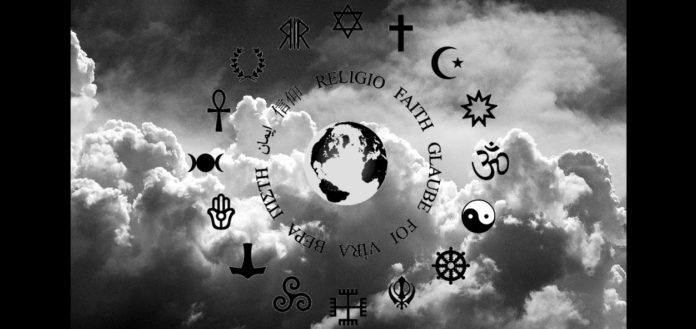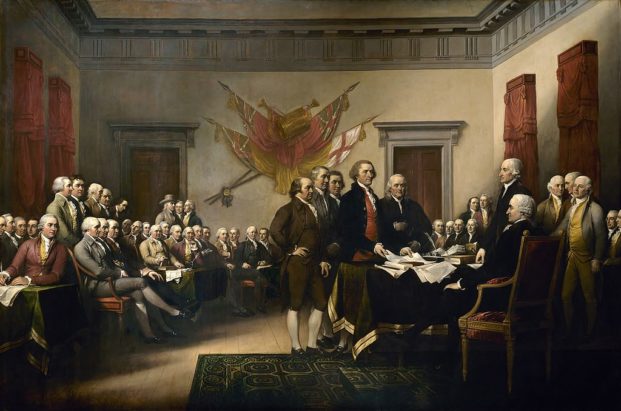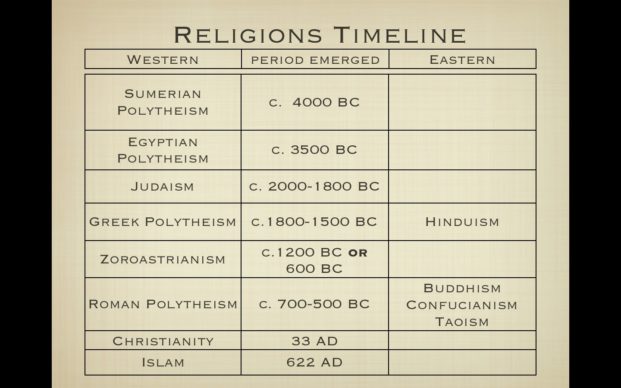
Part II: Comparative Mythology
This report is purely the view of the author, and not AnonHQ.
Religion today still plays a major role in conflict, as is evident with the current Muslim-scare sweeping the mainstream media. This inevitably has a direct influence on society, and as a result the topic of religion has once again come to the forefront. As such, it’s time someone stepped forward to shed some light on this sensitive topic, as uncomfortable as it may be.
Religion most often forms the foundation of a person’s belief system, down to the most intimate questions that involve the meaning of life, and what comes after death. Once we feel we have a good idea of what life is, or what’s to come, it’s hard to let go of those ideas. For many it’s even frightening.
This three-part report, which began as a personal project, will focus on religion from a neutral (non-denominational) standpoint, using only evidence that is source-based. Much of the information provided below will not be easy for some to accept, however the information has always been available. It simply isn’t “mainstream” information, and the average person doesn’t know there’s anything to research in the first place.
Part I: The History of Mankind
Forbidden Archeology
Forbidden archeology, which is also the name of a book written by Michael A. Cremo, is the report of archeological findings that do not fit the mainstream science community’s standardized belief system. It must be known that forbidden archeology is not conspiracy theory (though conspiracy theories often form around them), but actual physical evidence which mainstream scientists choose to ignore. The aspect of forbidden archeology focused on in this report is the history of man, as it pertains to the beliefs of various religions from around the world.
When it comes to the history of man, scientists focus their research on Darwin’s theory of evolution, which in spite of protests from those who believe it is seriously flawed, does admittedly require constant modification. As well as molding their research to Darwin’s Theory, whether they realize it or not, religion can still influence scientist’s research as well. This stems from the Age of Enlightenment when scientists and enlightened thinkers began to emerge across Europe, and though skepticism about religion began to grow at that time, most intellectuals—in an effort to keep from offending the Church—would mold their studies to religious beliefs, or ignore topics completely (Spielvogel, 2012, p. 515).

Today, it isn’t so much the Church that some scientists and various other modern enlightened-thinkers are worried about offending, but society itself. Governments also have an interest in keeping religion going since it can be used to brace their political structure and maintain the devotion of the people (take, for example, the U.S. motto “In God We Trust”). And so, evidence that contradicts standardized beliefs, even scientific, is locked away.
NBC Television Special—“The Mysterious Origins of Man”:
The earliest recordings from mankind come from the ancient Sumerians and the Early Dynastic Period of Egypt, roughly around 3500 B.C.E. (“Before Common Era”), (source). Religion has been around for about 50,000 years, as far as archeologists can tell from evidence such as cave-drawings, and modern religion has been around for about 5,200 years—basically since the beginning of written records. Taking Christianity into consideration, it began as a Second Temple Judaic sect in the mid-1st century, C.E. (“Common Era,” formerly A.D.), (Robinson, 2001, p. 229).

Mainstream scientists claim that modern humans have been in existence for about 200,000 + years, however forbidden archeology suggests it may be much longer than that, which is relevant if one takes into consideration that apparently we as humans, with our current intelligence capacity, only decided to stop living in caves around 6,000 years ago. It doesn’t make sense, but whatever timeline you choose to believe—if forbidden archeology is too “conspiracy” feeling for you—it begs the question either way; what were humans doing before written history?
Who were humans worshipping, and why would modern gods of religions that are considered to be “true religions” leave their people in a basic limbo for hundreds of thousands of years before introducing their laws to mankind? These are legitimate questions that many have asked over the years, and which most religious orders choose to ignore, especially Christianity, who claims human life began 6,000 years ago with Adam and Eve.
In Part II of this report, we will discuss Christianity further through comparative mythology, as it is the most practiced religion in Western nations, and in fact the world. We will also speak about Judaism and Islam, which Christianity is directly connected to, and through comparative mythology, we will see the similarities between various other religions around the world as well.
This Article (Understanding religion, Part I: the History of Mankind) is a free and open source. You have permission to republish this article under a Creative Commons license with attribution to the author and AnonHQ.com.
Sources:
American Chemical Society (2016). Chemistry in Context, (7th ed.). McGraw-Hill.
Burkert, Walter (1985). Greek Religion. Cambridge, MA: Harvard University Press.
Hoekema, Anthony A (1994). The Bible and the Future. Grand Rapids: Wm. B. Eerdmans.
Lane Fox, Robin (1989). Pagans and Christians. New York, NY: Knopf.
Massey, Gerald (1907). Ancient Egypt, the light of the world. London: T. Fisher Unwin.
Robinson, George (2001). Essential Judaism: A Complete Guide to Beliefs, Customs and Rituals. New York, NY: Simon & Schuster, Inc.
Spielvogel, Jackson J. (2012). Western Civilization (8th ed.). Boston, MA: Wadsworth.
The Future of World Religions: Population Growth Projections, 2010-2050. Pew Research Center. Retrieved from: http://www.pewforum.org/2015/04/02/religious-projections-2010-2050/
Thury, Eva M. (2013). Introduction to Mythology: Contemporary Approaches to Classical and World Myths (3rd ed.). New York, NY: Oxford University Press.
Unger, Merrill F. (1981). Unger’s Bible Dictionary. Chicago: Moody Bible Institute.





religion is the root of all evil, they were the first labels that were ever created to divide us and control us.
true